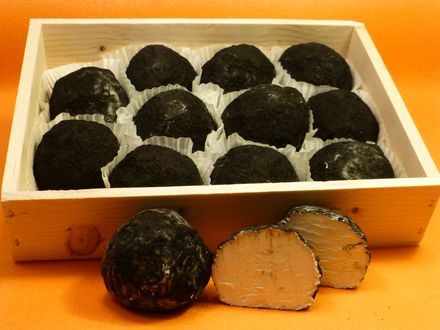
Organic ash cheese under threat!FACEnetwork calls for amendment of Annex VIII of the EU Organic Regulation |
|
The amendment to Annex VIII of the EU Organic Regulation (Regulation (EC) No. 889/2008) is nearing completion. In the current and previous drafts of the appendix, the use of vegetable carbon is not permitted for all cheeses. FACEnetwork has therefore requested the inclusion of all cheeses in the positive list, in a statement sent to the EU Commission. In addition, FACEnetwork has asked all its affiliates to contact their national ministries concerning the decision that will be made in September 2019 in Brussels. 
Ashed cheeses are produced all over Europe. Charcoal – A food additive with a long traditionCharcoal (Vegetable carbon; E 153) has been used in the production of cheese for many centuries. It has been used on unripened and ripened cheeses, made from the milk of several types of milking animal (including goat, sheep, cow, buffalo). See Annex I The best-known cheeses made with vegetable carbon include several French AOP cheeses (those with protected designation of origin)
Valençay is a french goat cheese made in the province of Berry in central France. Its name is derived from the town of Valençay in the Indre department.
Many dairies in Europe produce cheese with vegetable carbon. In recent years, many organic dairies have either had to withdraw their sheep and buffalo milk cheeses made with vegetable carbon, or market it as a conventional product, since Annex VIII (A) of Regulation (EC) No 889/2008 allows the use of vegetable carbon in:
Other cheeses made with vegetable carbon cannot currently be marketed as organic. This discriminates against producers of cow, sheep and buffalo cheese. We therefore call for vegetable carbon to be not only restricted to goats cheese, but also to be permitted for cheese made from other types of milk The revision of EU legislation on organic farming will result in amendments to Annex VIII. The draft revision of Annex IV (Ref .: Ares (2019) 4697957 – 19/07/2019) now provides for the use of vegetable carbon (E 153) for the following two cheeses (groups):
This change is not a significant improvement, since several types of cheese are excluded from the use of vegetable carbon. In particular, for the previously-mentioned AOP cheese made from goat`s milk (Sainte-Maure de Touraine, Selles-sur-Cher, Valencay), the new rules would be devastating, as they would no longer be allowed to be marketed as organic products. These cheeses are “ripened (matured) cheeses” and not “flavoured unripened cheeses”. The change would mean that many organic farms and cheese dairies across Europe would have to withdraw cheeses with a long history of production. See Annex II In view of the centuries-old tradition and the safety of vegetable carbon as an additive, this amendment to the Annex VIII is incomprehensible. We reject it because it would also harm some European cheese traditions. Since the use of vegetable carbon, both in the old version (Annex VIII) and in the new version (Annex IV), is not rejected in principle. In addition, the range of products should be extended to other types of milk. Scientific reservations against the use of vegetable carbon in cheese can therefore not have played a decisive role in the preparation of Annex IV. It is our proposal to allow automatic approval of vegetable carbon for all cheeses. Restricting the application of vegetable carbon to Morbier, ashed goat cheese or flavoured, unripened cheeses appears to be an arbitrary restriction which would discriminate against a large number of organic cheese producers. Vegetable carbon performs an important technological role on some surface-ripened cheeses as it neutralises rind acidity and assists in the implantation of the ripening microflora. We propose that Annex IV be amended as follows:
The organic sector is often seen as a sustainable and future-oriented form of food production. Organic dairies, which have committed themselves to the preservation of traditional, environmentally friendly production methods, should not be punished with the withdrawal of their right to market their products. face/mas&pt |
|
|
Date: 03-02-2022
© 2022 Farmhouse and Artisan Cheese & Dairy Producers European Network
All rights reserved Copies are only permitted with the permission of FACEnetwork |